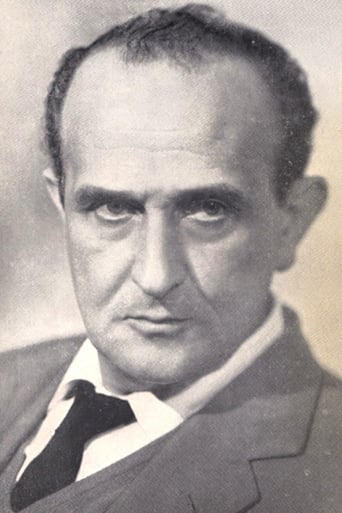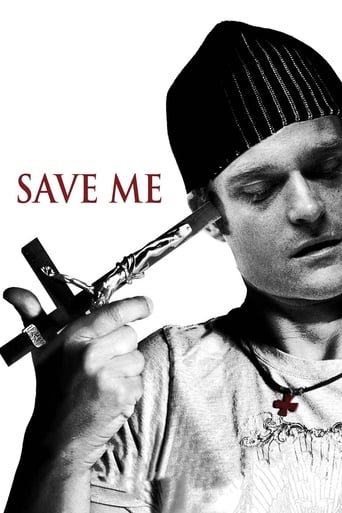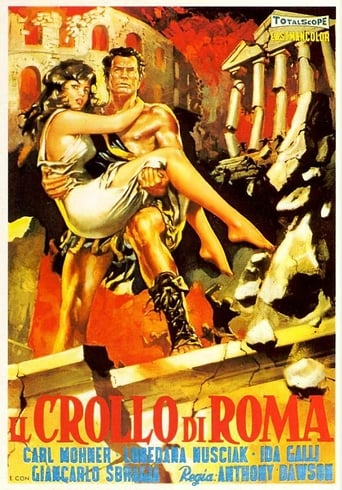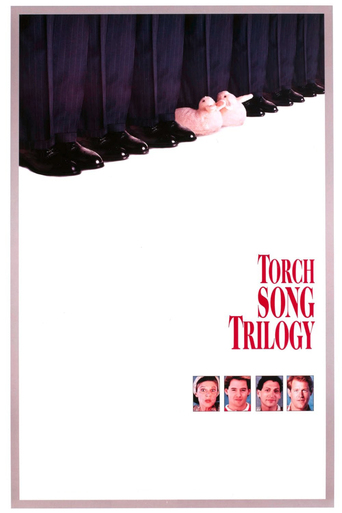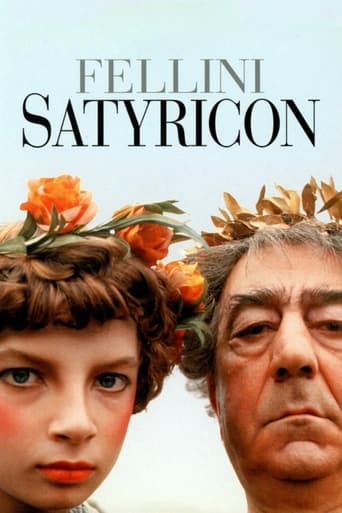

Fellini Satyricon (1970)
After his young lover, Gitone, leaves him for another man, Encolpio decides to kill himself, but a sudden earthquake destroys his home before he has a chance to do so. Now wandering around Rome in the time of Nero, Encolpio encounters one bizarre and surreal scene after another.
Watch Trailer
Cast
Similar titles


Reviews
One of my all time favorites.
Memorable, crazy movie
At first rather annoying in its heavy emphasis on reenactments, this movie ultimately proves fascinating, simply because the complicated, highly dramatic tale it tells still almost defies belief.
The movie's neither hopeful in contrived ways, nor hopeless in different contrived ways. Somehow it manages to be wonderful
This film is, in large part, homosexuality seen through a heterosexual male's lens. As a result, it fails at basic things. For instance, the blonde "protagonist" has a decent-looking male lover his age (who is regrettably unattractive in personality) but Fellini insists on having him desire a very homely-looking boy, one who also has an unappealing dully coquettish personality. Why? Obviously, this is to make a negative point about ancient Rome and homosexuality. "Ewww... how decadent, uncomfortable, and wrong it is!" That's apparently supposed to be the reaction. Fellini seems to conveniently exploit ignorance about homosexuality in his often drab little theatrical universe. The irony is probably that, given all of its varying settings and its "art is free!" mantra, the world itself is almost suffocatingly puny. There is a tremendous lack of vision in this film. I wonder if a man even needs to be gay to see how thin it is, just looking at the homosexuality angle. Even the superficially affirming scene with the minotaur may primarily be the sad "dominance" hypothesis reconstituted (where male homosexuality is not common at all in any animal species but is rather merely displays of dominance and submission - sexual aggression). Male lions, for instance, aren't allowed to enjoy sex according to humans. They simply must be aggressive rapists, or whatever.Fellini seems to enjoy the "freak show" - a carnival of second-rate wonders and horrors. A similar tack was taken with the Caligula film. "Oh, gee, those ancient Romans sure were gross, weren't they? Eww.. isn't homosexuality awful?" In that film it was even more pointed. The only homosexual sex act that occurred was between two very unattractive men in an extremely brief corridor scene, framed by Malcolm McDowell's ugly mug trying to look uglier than usual. Fisting is substituted for gay sex in that film in a totally brazen anti-gay schtick - where violence, pain, humiliation, and terribly subjugation are supposed to be the point of homosexual acts between men. Again, it's homosexuality through the prism of an ignorant heterosexual male point of view.While this film isn't as bad as that in some ways, as it's less simplistic in that regard, the casting of the pubescent boy is an obvious example of Fellini's refusal to present sex in a positive light. This can be seen in his film Cassanova very clearly, more so than in this film - which, at least, has two good-looking actors in it (despite their dishpan personalities). Cassanova has a scene where a stereotypically young gay man (hardly the apotheosis of gay male desire) appears, scantily clad, for a bit of dinner theater with a really ugly man. The grotesque and the camp seem to be the extent of Fellini's engagement with concepts of male homosexuality.I have read various opinions about what Fellini's point was... what themes he was trying to convey. Regardless, I can only say that nothing in this film was particularly thematically scintillating. The closest thing to interest was in the disconcerting nature of the radical setting/tone shifts, which, at least, distracted from the annoying "personalities" of the characters. If the idea was that the blonde couldn't find satisfaction then there is some coherence between the on-screen happenings to the character and the audience's frustration.The film felt like a demo rather than a finished production.
In "Satyricon", Fellini fills the screen with bodies and colors. Some describe this as "visual splendor", but the visual elements of this film are less than satisfying.This unconventional film seems to be dedicated to subversion or shock, perhaps for its own sake. But it lacks emotion, so as art, it is a shallow exercise. Art without emotional content is merely a collection of images.The scenes in "Satyricon" feel like fragments of dreams. Perhaps it was therapeutic for Fellini, but for the rest of us, it is merely a curiosity. Its concentration on images of religion, mysticism, and superstition makes it more irrelevant. The film's portrayal of the grotesque and absurd feels self-important and self-indulgent. In many ways, "Satyricon" is amateurish. The acting is bad. Actors laugh throughout the film for no apparent reason. The makeup is theatrical. The action and dialogue is disjointed. Even the English translation is horrible and unreliable, as if written by a first year student of English who is distracted.At one point in the film, a character says "playing a joke on a foreigner" is great fun. What fun Fellini may have had, laughing at the viewers who visited the strange world of "Satyricon".
A series of disjointed mythical tales set in first century Rome.I have seen a handful of Fellini's work, certainly the better-known ones. And while I have not seen them all, I will go on record as of now (2015) and say this was his best work. The costumes, the use of color, the strange, exotic world of Rome where actors use flatulence for humor.This is unlike anything you have even seen. Not as colorful or exotics as "Donkeyskin" and not as depraved as "Caligula", this is still a Rome where debauchery reigns. Impressively, although homosexual acts and relationships play a central part, there is practically nothing explicit (male or female) in the film, and can easily pass as PG.
Oh, me!... Oh, my!... Satyricon is, without question, one of those utterly grotesque and highly subjective films that I think rightly warrants psychoanalysis. It really does.Satyricon is something of a glutton's insatiable romp down "Depravity Lane". And, believe me, it's not a pleasant stroll (unless, of course, you happen to be a totally depraved glutton for punishment).Set in Imperial Rome during that mighty reign of Nero (in 60 AD), Satyricon is a literal madhouse of non-stop "WTF?" moments that will either deliver great pleasure or else sicken you with its outright repulsiveness.Filled to overflowing with ghastly-looking characters, homosexual overtones, torture and cruelty, Satyricon certainly didn't leave a whole lot to the imagination.Filmed in 1969, Satyricon was directed (with an obvious cynical glee) by Federico Fellini.Personally, I found this film's twisted story of ancient times to be quite an ugly movie-experience that, regardless of its truly weird and bizarre nature, wore out its welcome (and its novelty) within its first 30 minutes.


